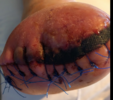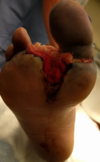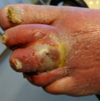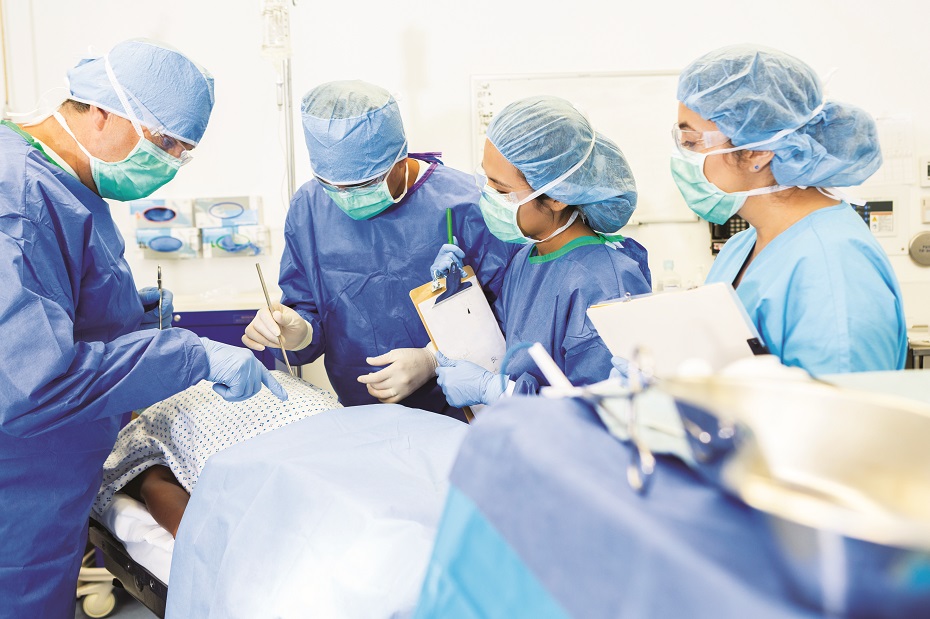- Joined
- Oct 17, 2011
- Messages
- 2,762
- Reaction score
- 6,277
You're on call. A new patient shows up your list - admitted septic overnight. Some sort of forefoot gangrene, meth injecting, diabetic, vasculopath, smoker train wreck. Or perhaps another DPM already took a crack at a partial amp or toe amp and the whole thing fell apart (and they don't have priviledges at your hospital or the patient was transfered to you because you have vascular at your hospital). Vascular is going to take a crack tomorrow or maybe they just want to see what happens and tell you they'll follow as necessary. You've never met the patient before. You have no relationship with them or care up to this point. Inevitably they have no PCP, no management of their insulin, and likely a slieue of other comorbidities.
So they get multidisciplinary treatment with hospitalist, ID, vascular, etc. You amp (not a toe code - let's say 28805 with some secondary/staged surgeries) before or after vascular intervenes depending on what has to be done, but let's say either they
(a) leave the hospital already dehiscing/open/
(b) start to deteriorate/necrose immediately upon coming in for their first/early post-op visits.
Forget whether this should have been a BKA or what not - you take over care of patient you met in the hospital on which you've operated/amputated and will be delivering post-op care until next level amputation.
At your first-second whatever post-op this patient already needs debridement/clean-up whatever which will be performed in your office. When do you begin billing for debridement?
I have a variety of scenarios in mind, but I'll start with a disastrous infection to wound/ulcer complication first. From the get go this patient may require some sort of ulcer debridement code. Medicare pays $125 for a 11042 in a private office. An isolated TMA is $700. If you think this patient has insurance you are kidding yourself, but the financial dynamics here are real - there's a lof of care to be delivered for months potentially for free that painfully is worth substantially more than the original surgery.
Urban Legend? If you indicate at first encounter (in hospital) that this patient will require staged care / future debridement /multiple surgeries your post-op debridement codes even in the global are cool?
----
And now for some book bases rules from the text above
Page 6:
What services are included in the global surgery payment?
Medicare includes the following services in the global surgery payment when provided in addition to the surgery:
• Pre-operative visits after the decision is made to operate. For major procedures, this includes preoperative visits the day before the day of surgery. For minor procedures, this includes pre-operative visits the day of surgery.
• Intra-operative services that are normally a usual and necessary part of a surgical procedure
• All additional medical or surgical services required of the surgeon during the post-operative period of the surgery because of complications, which do not require additional trips to the operating room
• Follow-up visits during the post-operative period of the surgery that are related to recovery from the surgery
• Post-surgical pain management by the surgeon
• Supplies, except for those identified as exclusions
• Miscellaneous services, such as dressing changes, local incision care, removal of operative pack, removal of cutaneous sutures and staples, lines, wires, tubes, drains, casts, and splints; insertion, irrigation, and removal of urinary catheters, routine peripheral intravenous lines, nasogastric and rectal tubes; and changes and removal of tracheostomy tubes
Ok - mostly Bummer...
BUT
What services are not included in the global surgery payment? The following services are not included in the global surgical payment. These services may be billed and paid for separately:
• Initial consultation or evaluation of the problem by the surgeon to determine the need for major surgeries. This is billed separately using the modifier “-57” (Decision for Surgery). This visit may be billed separately only for major surgical procedures.
• Services of other physicians related to the surgery, except where the surgeon and the other physician(s) agree on the transfer of care. This agreement may be in the form of a letter or an annotation in the discharge summary, hospital record, or ASC record.
• Visits unrelated to the diagnosis for which the surgical procedure is performed, unless the visits occur due to complications of the surgery
• Treatment for the underlying condition or an added course of treatment which is not part of normal recovery from surgery
• Diagnostic tests and procedures, including diagnostic radiological procedures • Clearly distinct surgical procedures that occur during the post-operative period which are not re-operations or treatment for complications
• Treatment for post-operative complications requiring a return trip to the Operating Room (OR). An OR, for this purpose, is defined as a place of service specifically equipped and staffed for the sole purpose of performing procedures. The term includes a cardiac catheterization suite, a laser suite, and an endoscopy suite. It does not include a patient’s room, a minor treatment room, a recovery room, or an intensive care unit (unless the patient’s condition was so critical there would be insufficient time for transportation to an OR).
• If a less extensive procedure fails, and a more extensive procedure is required, the second procedure is payable separately.
• Immunosuppressive therapy for organ transplants • Critical care services (CPT codes 99291 and 99292) unrelated to the surgery where a seriously injured or burned patient is critically ill and requires constant attendance of the physician.
OK - maybe some good and bad in the above.
The first line I bolded would seem to be a bummer for a scenario I've wondered about.
if you did a lapidus that non-unioned. The original diagnosis is hallux valgus, the secondary diagnosis is non-union but its a complication of the surgery... so technically talking about the non-union and 24ing it would be problematic/no-go - except - a non-union isn't part of the normal recovery, just saying. That said, taking them back to the OR and taking down the fusion/redoing it is covered.
However, what's interesting is the idea of added treatment which is not part of the normal recovery of the surgery.
So - what is a normal recovery from surgery?
Do people who immediately start debriding (and bill) justify that the course of treatment is outside the normal recovery?



